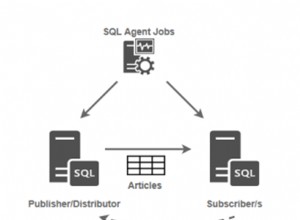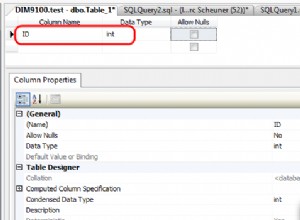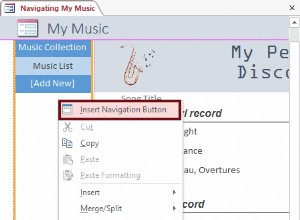Pokaż obraz na ekranie przed zapisaniem:
Użyj mojego kodu. Robię zdjęcie za pomocą intencji aparatu i przed zapisaniem go w galerii jest ono pokazywane użytkownikowi za pomocą przycisku Zapisz i Anuluj :- Zadzwoń do intencji kamery :-
// This code is to call the camera intent. Basically it will start your camera. Put this code in a button or something
String SD_CARD_TEMP_DIR = Environment.getExternalStorageDirectory() + File.separator +CommonFunction.getDateTime()+".jpg"; // Get File Path
Intent takePictureFromCameraIntent = new Intent(android.provider.MediaStore.ACTION_IMAGE_CAPTURE);
takePictureFromCameraIntent.putExtra(MediaStore.EXTRA_OUTPUT, Uri.fromFile(new File(SD_CARD_TEMP_DIR)));
startActivityForResult(takePictureFromCameraIntent, 123);
onActivityResult:-
// This function is called when you come back to your activity after the intent has finished. Do read android documentation on Google. It will Help
public void onActivityResult(int requestCode, int resultCode, Intent data)
{
super.onActivityResult(requestCode, resultCode, data);
if (requestCode == CAMERA_RESULT)
{
if (resultCode == Activity.RESULT_OK)
{
String galleryImatePath = SD_CARD_TEMP_DIR; // make SD_CARD_TEMP_DIR Global so that you can access it here from camera intent or pass it in put Extra method and retrieve it here
File f = new File(galleryImatePath);
try {//This code will rotate your image if you have taken the image by rotating the camera
Bitmap cameraBitmap = null;
BitmapFactory.Options bmOptions = new BitmapFactory.Options();
bmOptions.inJustDecodeBounds = false;
bmOptions.inPurgeable = true;
bmOptions.inBitmap = cameraBitmap;
bmOptions.inMutable = true;
cameraBitmap = BitmapFactory.decodeFile(galleryImatePath,bmOptions);
ByteArrayOutputStream bos = new ByteArrayOutputStream();
cameraBitmap.compress(Bitmap.CompressFormat.JPEG, 50, bos);
//To Rotate image Code
ExifInterface exif = new ExifInterface(galleryImatePath);
float rotation = exif.getAttributeInt(ExifInterface.TAG_ORIENTATION, ExifInterface.ORIENTATION_NORMAL);
System.out.println(rotation);
float rotationInDegrees = exifToDegrees(rotation);
System.out.println(rotationInDegrees);
Matrix matrix = new Matrix();
matrix.postRotate(rotationInDegrees);
final Bitmap rotatedBitmap = Bitmap.createBitmap(cameraBitmap , 0, 0, cameraBitmap.getWidth(), cameraBitmap.getHeight(), matrix, true);
FileOutputStream fos=new FileOutputStream(galleryImatePath);
rotatedBitmap.compress(Bitmap.CompressFormat.JPEG, 50, fos);
fos.write(bos.toByteArray());
cameraBitmap.recycle();
System.gc();
fos.flush();
fos.close();
// To set image in imageview in dialog. This code will set your image in a custon dialog box "captiondialog". It will contain a full width and height imageview and two textviews - done and cancel. It is upto u what you want to define in the textview's click listener. For example, you can pass the storing image in database in the "Done" textview and "Cancel" textview will dismiss your captiondialog and you app will return to your activity
Capdialog = new Dialog(AddToDo.this,android.R.style.Theme_NoTitleBar_Fullscreen);
Capdialog.setContentView(R.layout.captiondialog);
Capdialog.setCancelable(false);
TextView cancel = (TextView) Capdialog
.findViewById(R.id.cancel);
TextView done = (TextView) Capdialog.findViewById(R.id.done);
Capdialog.getWindow().setSoftInputMode (WindowManager.LayoutParams.SOFT_INPUT_STATE_ALWAYS_HIDDEN);
ImageView img = (ImageView) Capdialog.findViewById(R.id.image);
img.setImageBitmap(rotatedBitmap);
}
catch(Exception e){}
}
}
}
zaimplementuj swoje gotowe i anuluj na click listener - co chcesz w nich zrobić. Mój kod przechwyci Twój obraz, obróci go we właściwym kierunku niezależnie od obrotu kamery i pokaże go w oknie dialogowym przed zapisaniem
Ten kod będzie przechowywać twój obraz w DB. Musisz użyć "blob" do przechowywania obrazu. Użyj tego kodu :-public void insertImageInDb(int id , Bitmap img ) {
byte[] data = bos.toByteArray(); // Use This or the code in comments below
/* ByteArrayOutputStream outputStream = new ByteArrayOutputStream();
bitmap.compress(CompressFormat.PNG, 0, outputStream);
byte[] data = outputStream.toByteArray();*/
insertStatement_logo.bindLong(1, id);
insertStatement_logo.bindBlob(2, data);
insertStatement_logo.executeInsert();
insertStatement_logo.clearBindings() ;
}
Istnieje alternatywna czynność intencji dla kamery urządzenia, która uruchamia kamerę w trybie nieruchomego obrazu i nie kończy działania, dopóki użytkownik nie zakończy działania:
Intent intent = new Intent(
MediaStore.INTENT_ACTION_STILL_IMAGE_CAMERA);
this.startActivity(intent);
W połączeniu z ContentObserverem było to dokładnie to, co musiałem osiągnąć. lub Zajmij się tym w ActivityResult.
Uwaga :- jeśli jesteś nowy w Androidzie, jest to dla ciebie zbyt trudne do zrozumienia. Przeczytaj najpierw dokumentację Androida w Google i przeczytaj samouczki. Twórz podstawowe aplikacje. Naucz się najpierw




